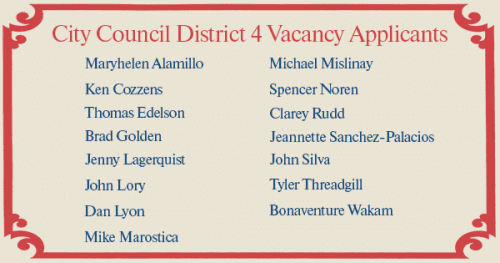
“The man who asks a question is a fool for a minute, the man who does not ask is a fool for life.”
—Confucius

No one makes a lifetime commitment based on a single moment in time. Yet, the Ventura City Council made just such a commitment. In November 2020, they awarded step and merit increases to city employees based on revised sales tax figures. This decision is disturbing on several levels:
- The city staff led the Council to believe financial conditions were improving based on very short-term statistics.
- The people benefiting from the salary increases were the ones making the recommendation.
- Our elected officials failed to question the rosy picture the staff presented during the pandemic economic shutdown.
How Did We Get Here?
In the city’s fiscal year 2020-2021, the Ventura City Council faced a $12.0 million budget deficit due to California’s coronavirus shutdown. The city staff recommended a dozen possible solutions to the problem. Among them was the option to ‘defer’ $1 million in employee salary increases for step and merit increases until financial conditions improved.
As a provision of the FY2020-21 budget, former-Mayor Matt LaVere, the City Council and all the bargaining units agreed to freeze employee step and merit increases as a down payment on the massive reductions necessary in the year ahead.
Mid-Course Correction
The City Council receives regular updates on sales tax revenue collected. These reports include recent figures and may also include projections based on current trends. The updates are very short-term, especially in the early part of the fiscal year. Predictions made from these limited data may seem overly optimistic. Any upward trend tempts city staff and the Council to overreact. Past City Councils have been guilty of spending money from these projections because they seemed ‘good.’ The tendency is to see these projections through rose-colored glasses.

What Was The New Projection That Justified The Step And Merit Increases?
To everyone’s surprise, the September sales tax report update was higher than anticipated. The city staff projected that General Fund would be $1.657 million higher than forecasted. The City Council seized this as the ‘green light’ to reinstate the employee step and merit increases.
At the November 9, 2020 meeting, the Council rescinded the suspended step and merit salary increases for city employees. The suspension lasted only eight months, from March to November 2020.
Was The Decision To Grant Step And Merit Increases Logical?
 The Council made its November decision based on data presented on September 23, 2020, a month and a half earlier. The Council received no updated data on which to decide. If they had, the decision might have been different.
The Council made its November decision based on data presented on September 23, 2020, a month and a half earlier. The Council received no updated data on which to decide. If they had, the decision might have been different.
In a report prepared by Michael Coon, the Director of Finance & Technology, after the Council’s November 9th decision, the $1.657 million surplus became a $483K deficit.
By the January 2021 Budget Workshop presentation to the new Council, the General Fund was positive again by $264,000. Mr. Coon admitted that $264,000 is a slim margin on a $116 million budget (0.2%).
What’s Happening With The General Fund?
The $1.657 million General Fund surplus presented in September 2020 was misleading. Yes, sales tax revenue was higher, but that didn’t account for the excess. Two unique, one-time events inflated the figures.
The General Fund received $2.0 million from the CARES Act funding. The city also received a donation from the Marion Schwab Trust.
Without these two rare revenue infusions, the city would have had $2.4 million less revenue than the city staff led the Council to believe when deciding to award the step and merit increases.
What’s more, on September 24, 2020, the city staff failed to mention the City Council’s risks to the General Fund. Player’s Casino Card Room sales taxes, parking violations, and Parks & Recreation programming were below budget. Mr. Coon’s November 2020 report shows revenue fell more than $5.2 million below budget in those three areas.
The Result Of Their Actions On Raises
In June, Councilmember Jim Friedman warned of an “absolute financial disaster” in the coming years if the city doesn’t continue to cut spending. Yet, the City Council reversed their earlier spending restraint and awarded over $719,000 in pay increases to city employees.
In June 2020, City Manager Alex McIntyre spoke of “shared sacrifice” when announcing the step and merit increases. Today, thousands of Ventura residents are not working. And those private-sector workers that remain employed may experience outright cuts in their pay and hours. Scores of businesses are closed by the pandemic and face bankruptcy. At City Hall, where jobs and salaries are guaranteed, things look very different, however.
What Can We Do?
Every budget cycle, the city goes through the same experience. The budget process begins in January and ends in June for the following year’s budget. Each year, the city staff presents their best estimate of what next year will bring. Often, those  estimates are optimistic. “We believe we’re conservative not to paint too bleak a picture,” Mr. Coon told the City Council on January 11, 2021. And, our City Council makes long-term decisions based on the short-term data they receive.
estimates are optimistic. “We believe we’re conservative not to paint too bleak a picture,” Mr. Coon told the City Council on January 11, 2021. And, our City Council makes long-term decisions based on the short-term data they receive.
Staff isn’t always right. No one has examined the budgeting process for a long time. Periodically, it would be a good idea to have independent, outside consultants provide an unbiased analysis of Ventura’s budgeting. This evaluation should be different from the accountant’s review of the Comprehensive Annual Financial Report (CAFR), which is always 18 months in arrears.
Editors Comments
We believe the City Council made the November decision to award the step and merit increases on flawed forecasts from staff. The City Council accepted the General Fund revenue would be $1.657 million higher in the middle of a pandemic. The Council decided based on a September bump in the sales tax revenue for the first four months of the fiscal year 2020-21. And, the data didn’t include the all-important Christmas season sales tax revenue. The Council made long-term decisions based primarily on short-term data.
 It seems clear that city staff provided fluid, optimistic data to the Council for their decision. Mr. Coon explained the projections, saying, “We are feeling alright with the additional projection of $1.5 million in Sales Tax for the current fiscal year. It is something that we definitely want to keep an eye on, especially if we start to see more businesses close.
It seems clear that city staff provided fluid, optimistic data to the Council for their decision. Mr. Coon explained the projections, saying, “We are feeling alright with the additional projection of $1.5 million in Sales Tax for the current fiscal year. It is something that we definitely want to keep an eye on, especially if we start to see more businesses close.
“Currently, we are basically projecting that we will receive the same amount of Sales Tax this fiscal year that we received last fiscal year…the city would have received about $30 million in sales tax for FY 20-21 without the pandemic. So, the projections do factor in about a 10% decline from the activity that was seen in Jul-Dec 2019. This decline isn’t on the higher end because online sales tax collection is doing so well and offsetting the losses of some of the brick and mortar stores that are experiencing losses at the higher end of the spectrum.”
At a higher level, citizens should be concerned about this process. The same people who prepare the reports used to decide salary increases are the same people who get the raises.
Our concern isn’t with the exact budget numbers. We question using numbers provided by the very people who enjoy the increases. We also have reservations about the Council relying on unseasoned numbers over time.
And, we’re disappointed by the elected officials that failed to question staff’s rosy projections when we’re in the middle of a pandemic. There were variations in the General Fund projections from September 2020 to November 2020 to January 2021. Two different City Councils spanned that period. One would have hoped that at least one Councilmember would have remarked on the General Fund’s changes from positive to negative and back to slightly positive over that time. Yet, no one did.
Only four Councilmembers remain from the group that awarded the increases. They are Lorrie Brown, Jim Friedman, Erik Nasarenko and Sofia Rubalcava. At the January 2021 budget workshop, two Councilmembers (Ms. Brown and newcomer Mike Johnson) expressed concern about the COVID-19 impact on the city’s finances. One wonders why the other five didn’t share the same anxiety. We hope that the new Council will be more rigorous in asking questions when preparing next year’s budget.
Write Directly To Your City Councilmember To Insist They Ask More Insightful Questions During Budgeting
Below you’ll find the photos of our current City Council. Click on any Councilmember’s photo and you’ll open your email program ready to write directly to that Councilmember.
For more information like this, subscribe to our newsletter, Res Publica. Click here to enter your name and email address.














 The most practical option available to the Council was to appoint a replacement. Four of the Councilmembers didn’t want to wait for a special election in November 2021. Nobody wanted to wait until November 2022 to fill the vacancy because of the concern about not having a seventh vote to break any tie vote.
The most practical option available to the Council was to appoint a replacement. Four of the Councilmembers didn’t want to wait for a special election in November 2021. Nobody wanted to wait until November 2022 to fill the vacancy because of the concern about not having a seventh vote to break any tie vote.
 The logistics of the procedure are grueling for both the applicants and the City Council. Interviewing all fifteen candidates in one sitting will be wearisome. It’s hard to imagine that the Councilmember’s attention will be as sharp at the end of the day as it was in the beginning.
The logistics of the procedure are grueling for both the applicants and the City Council. Interviewing all fifteen candidates in one sitting will be wearisome. It’s hard to imagine that the Councilmember’s attention will be as sharp at the end of the day as it was in the beginning.




 The Council made its November decision based on data presented on September 23, 2020, a month and a half earlier. The Council received no updated data on which to decide. If they had, the decision might have been different.
The Council made its November decision based on data presented on September 23, 2020, a month and a half earlier. The Council received no updated data on which to decide. If they had, the decision might have been different. estimates are optimistic. “We believe we’re conservative not to paint too bleak a picture,” Mr. Coon told the City Council on January 11, 2021. And, our City Council makes long-term decisions based on the short-term data they receive.
estimates are optimistic. “We believe we’re conservative not to paint too bleak a picture,” Mr. Coon told the City Council on January 11, 2021. And, our City Council makes long-term decisions based on the short-term data they receive. It seems clear that city staff provided fluid, optimistic data to the Council for their decision. Mr. Coon explained the projections, saying, “We are feeling alright with the additional projection of $1.5 million in Sales Tax for the current fiscal year. It is something that we definitely want to keep an eye on, especially if we start to see more businesses close.
It seems clear that city staff provided fluid, optimistic data to the Council for their decision. Mr. Coon explained the projections, saying, “We are feeling alright with the additional projection of $1.5 million in Sales Tax for the current fiscal year. It is something that we definitely want to keep an eye on, especially if we start to see more businesses close.